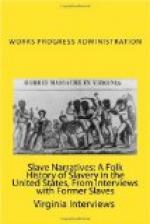“I never learned to read until I was 26 years old. That was after I left the plantation. I was staying at a place washing dishes for Goodyear’s at Sapville, Georgia, six miles from Waycross. I found a Webster’s spelling book that had been thrown away, and I learned to read from that.
“I wasn’t converted until I went to work in a turpentine still and five years later I was called to preach. I am one of thirteen children and none of us has ever been arrested. We were taught right.
“I kept on preaching until I came to Miami. I have been assistant pastor at Bethel African Methodist Church for the past ten years.
“I belong to a class of Negroes called Geechees. My grandfather was brought directly from Africa to Port Royal, South Carolina. My grandmother used to hold up her hand and look at it and sing out of her hand. She’d make them up as she would look at her hand. She sang in Geechee and also made rhymes and songs in English.”
FEDERAL WRITERS’ PROJECT American Guide, (Negro Writers’ Unit)
Cora Taylor
Frances H. Miner, Editor
Miami, Florida
Rivana Boynton [TR: also reported as Riviana.]
1. Where, and about when, were you born?
Some time in 1850 on John and Mollie Hoover’s
plantation between
Savannah and Charleston near the Georgia line.
2. If you were born on a plantation or farm, what sort of farming section was it in?
They raised rice, corn wheat, and lots of cotton, raised everything they et—vegetables, taters and all that.
3. How did you pass the time as a child? What sort of chores did you do and what did you play?
I had to thin cotton in the fields and mind the flies at the table. I chased them with a fly bush, sometimes a limb from a tree and sometimes wid a fancy bush.
4. Was your master kind to you?
Yes, I was favored by being with my massy.
5. How many slaves were there on the same plantation and farm?
I don’t know. There was plenty o’ dem up in de hundreds, I reckon.
6. Do you remember what kind of cooking utensils your mother used?
Yes, dey had spiders an’ big iron kettles that dey hung in de chimney by a long chain. When dey wanted to cook fast dey lowered de chain and when dey wanted to bake in the spiders, they’s put them under de kettle can cover with coals until dey was hot. Dey’d put de pones in does double concerned spiders and turn them around when dey was done on one side.
7. What were your main foods and how were they cooked?
We had everything you could think of to eat.
8. Do you remember making imitation or substitute coffee by grinding up corn or peanuts?
No. We had real coffee.
9. Do you remember ever having, when you were young, any other kind of bread besides corn bread?




